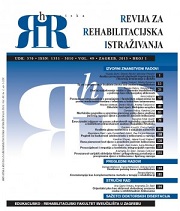Emocionalni odgovor na posao zdravstvenih suradnika zaposlenih u bolničkom zdravstvenom sustavu Republike Hrvatske
Emotional Response to Work in Health Associates Employed in Public Health Hospital System in Republic of Croatia
Author(s): Nevenka Kišak GverićSubject(s): Education
Published by: Sveučilište u Zagrebu, Edukacijsko-rehabilitacijski fakultet
Keywords: emotional response to work; counterproductive behavior; physical symptoms of stress; health associates
Summary/Abstract: As a part of wider research of emotional well-being of health associates, this research investigates their emotional response to work. For that purpose we investigated age related differences in self perception of emotional responses to work and the nature of their connection to contra productive behavior and physiological disturbances as symptoms of stress. 112 health associates employed in public health system in hospitals in Croatia have been included into the research by questionnaire, which they willingly filled in. The questionnaire was based on 4 measuring instruments that were used to evaluate emotional responses to work, counterproductive behaviors at work, physical symptoms of stress and to gain an insight into sociodemographic characteristics of examenees. Descriptive analysis, factor analysis, variance analysis, Scheffe’s Post-hoc Test and cannonical correlation analysis were used in process of gaining valid data. In youngest health associates, with least working experience, feeling positive and negative emotions at the same time is characteristical, as it is feeling only positive emotions in those with the most working experience. Positive emotions are the least present in middle-aged associates, who are mostly frustrated by their work. Negative emotions at work are connected with more frequent counterproductive behaviors and with physical symptoms of stress. Although there is a certain research limit concerning convenient sample, self given statements by the examinees and one timeline information gathering, the results were as expected, they confirmed those in literature as well as the results of other similar research, and they match empirical knowledge. They became a starting point for further research (which is in progress), which will determine personal and organizational characteristics that contribute to emergence of certain emotional responses to work. In that way the knowledge of emotional well-being of health associates can be shared and it can be used in creation of adequate support programs to help those profiles. This research identified age groups that could use them and corroborated the reasons for their use.
Journal: Hrvatska revija za rehabilitacijska istrazivanja
- Issue Year: 49/2013
- Issue No: 1
- Page Range: 78-91
- Page Count: 14
- Language: Croatian

